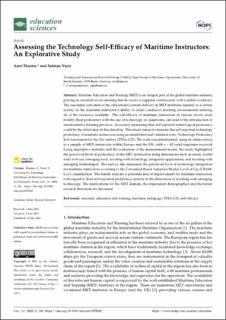Assessing the technology self-efficacy of maritime instructors: An explorative study
Peer reviewed, Journal article
Published version
Permanent lenke
https://hdl.handle.net/11250/2986411Utgivelsesdato
2021Metadata
Vis full innførselSamlinger
Originalversjon
Sharma, A. & Nazir, S. (2021). Assessing the Technology Self-Efficacy of Maritime Instructors: An Explorative Study. Education Sciences, 11(7), Artikkel 342. https://doi.org/10.3390/educsci11070342Sammendrag
Maritime Education and Training (MET) is an integral part of the global maritime industry, playing an essential role in ensuring that the sector is supplied continuously with a skilled workforce. The successful outcomes of the educational content delivery in MET institutes depend, to a certain extent, on the maritime instructor’s ability to create conducive learning environments utilizing all of the resources available. The self-efficacy of maritime instructors in various facets, most notably their proficiency with the use of technology in classrooms, can lead to the introduction of transformative learning practices. Accurately measuring their self-reported technological proficiency could be the initial step in this direction. This study aimed to measure the self-reported technology proficiency of maritime instructors using an established and validated scale: Technology Proficiency Self-Assessment for the 21st century (TPSA-C21). The scale was administered, using an online survey, to a sample of MET instructors within Europe and the UK, with n = 62 valid responses received. Using descriptive statistics and the evaluation of the measurement model, the study highlighted the perceived level of proficiency of the MET instructors along dimensions such as email, world-wide web use, emerging tools, teaching with technology, integrated applications, and teaching with emerging technologies. The survey also measured the perceived level of technology integration for maritime instructors according to the Concerned-Based Adoption Model–Level of Use (CBAM–LoU) classification. The results indicate a potential area of improvement for maritime instructors with regard to their self-reported proficiency, namely in the dimension of teaching with emerging technology. The implications for the MET domain, the respondent demographics and the future research directions are discussed.

